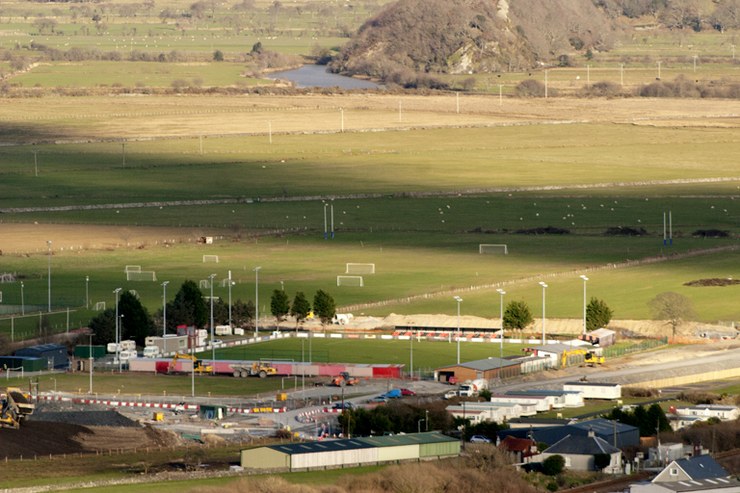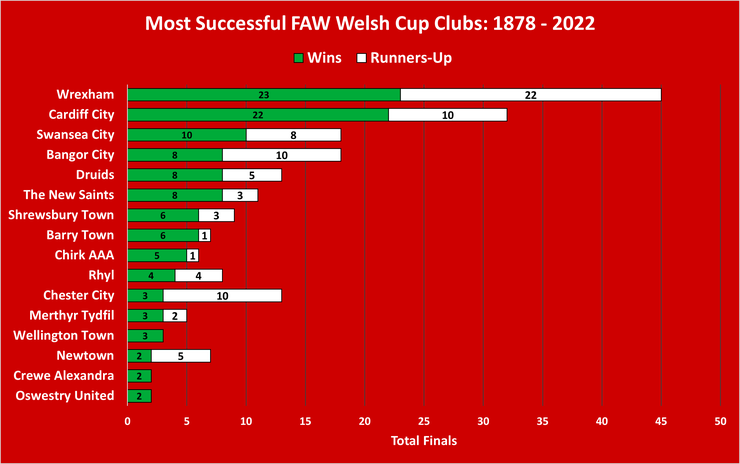The FAW Welsh Cup is the principal cup competition for clubs playing in the Welsh football leagues. This was founded in 1877 making it the third oldest competition of its type in the world behind the English FA Cup and the Scottish FA Cup.
The three most successful clubs in the competition’s history all play their football in the English Leagues with Wrexham winning on 23 occasions, Cardiff City with 22 wins and Swansea City with 10 wins. These clubs were invited to take part until 1995 when the rules changed to only allow clubs playing the Welsh system.
Welsh Cup Winners By Year
| Season | Winner | Score | Runner-up |
|---|---|---|---|
| 2022–23 | The New Saints | 6–0 | Bala Town |
| 2021–22 | The New Saints | 3–0 | Penybont |
| 2020–21 | Cancelled | ||
| 2019–20 | Cancelled | ||
| 2018–19 | The New Saints | 3–0 | Connah’s Quay Nomads |
| 2017–18 | Connah’s Quay Nomads | 4–1 | Aberystwyth Town |
| 2016–17 | Bala Town | 2–1 | The New Saints |
| 2015–16 | The New Saints | 2–0 | Airbus UK Broughton |
| 2014–15 | The New Saints | 2–0 | Newtown |
| 2013–14 | The New Saints | 3–2 | Aberystwyth Town |
| 2012–13 | Prestatyn Town | 3–1 | Bangor City |
| 2011–12 | The New Saints | 2–0 | Cefn Druids |
| 2010–11 | Llanelli | 4–1 | Bangor City |
| 2009–10 | Bangor City | 3–2 | Port Talbot Town |
| 2008–09 | Bangor City | 2–0 | Aberystwyth Town |
| 2007–08 | Bangor City | 4–2 | Llanelli |
| 2006–07 | Carmarthen Town | 3–2 | Afan Lido |
| 2005–06 | Rhyl | 2–0 | Bangor City |
| 2004–05 | Total Network Solutions | 1–0 | Carmarthen Town |
| 2003–04 | Rhyl | 1–0 | Total Network Solutions |
| 2002–03 | Barry Town | 2–2 | Cwmbarn Town |
| 2001–02 | Barry Town | 4–1 | Bangor City |
| 2000–01 | Barry Town | 2–0 | Total Network Solutions |
| 1999–20 | Bangor City | 1–0 | Cwmbran Town |
| 1998–99 | Inter Cable-Tel | 1–1 | Carmarthen Town |
| 1997–98 | Bangor City | 1–1 | Connah’s Quay Nomads |
| 1996–97 | Barry Town | 2–1 | Cwmbran Town |
| 1995–96 | Llansantffraid | 3–3 | Barry Town |
| 1994–95 | Wrexham | 2–1 | Cardiff City |
| 1993–94 | Barry Town | 2–1 | Cardiff City |
| 1992–93 | Cardiff City | 5–0 | Rhyl |
| 1991–92 | Cardiff City | 1–0 | Hednesford Town |
| 1990–91 | Swansea City | 2–0 | Wrexham |
| 1989–90 | Hereford United | 2–1 | Wrexham |
| 1988–89 | Swansea City | 5–0 | Kidderminster Harriers |
| 1987–88 | Cardiff City | 2–0 | Wrexham |
| 1986–87 | Merthyr Tydfil | 1–0 | Newport County |
Tournament Format

As is the case in England and Scotland, Wales has two major domestic cup competitions. In addition to the FAW Welsh Cup, they have the less prestigious Welsh League Cup which largely consists of teams just from the top two tiers (three divisions) of Welsh football. The more illustrious and significantly older Welsh Cup however is a wider competition with over 100 sides taking part each season. The earliest qualification rounds regularly start as early as August although the exact date does tend to vary each season.
Like most cup competitions, it employs a straightforward knockout system throughout. There are no second chances so one defeat means the end to a team’s hopes and dreams for another year. The Welsh Cup does differ from some of its equivalent competitions though in that there are no replays at any stage. This means that all fixtures are settled on the day and for those that end all square, at any stage in the competition, they will head straight to penalties.
The benefit of avoiding replays is that there is no danger of the Welsh Cup creating any fixture congestion across the various domestic leagues. On this point, it is worth mentioning that the Welsh Cup is contested solely by Welsh clubs. Now, this may seem an extremely obvious point, but English clubs located close to the border have previously taken part in, and even won this cup before.
Recent Rule Changes
The worldwide health crisis saw the latter stages of the 2019/20 Welsh Cup cancelled and the 2020/21 Welsh Cup completely abandoned but it did return in 2021/22 with several major tweaks to the rules. One big change was that extra-time was scrapped, with all matches level after 90 minutes heading straight to penalties instead. Although it was not clear if this was intended to be a long-term change, many of the other changes introduced this year were clearly permanent additions to the competition.
These changes included a reworking of the prize money system to assure that every single victory would result in a share of the total prize pot, even in the first qualification round. For the 2021/22 edition, the entire prize pot stood at around £189,000, a meagre sum by the standards of bigger leagues around the world. The National Cup Board also introduced a seeding system for the second round, which had not been there previously. The second round was also expanded so that top flight teams could join at this stage, one round earlier than had previously been the case.
The other significant change was the move to put a coefficient ranking system in place, which would cover a five-year period. As part of this, teams receive six points for winning the competition, three points for each match win and one point for losing a tie on penalties. The reason for creating this system is that it can assist when allocating byes and seedings in future years of the competition.
Qualification Rounds

There are usually two qualification rounds before you get to the ‘proper’ stages of the Welsh Cup. Both of these rounds are divided into regions to reduce the amount of traveling away teams face. For the draw, teams are divided into a north, central and south section. Each section does not have an equal number of teams though as there are far fewer teams located within the central region.
You may see the odd walkover result in the qualification rounds (2021/22 saw an increased amount due to the events of 2020) but most matches went ahead as scheduled. Games typically take place at the normal home ground too although now and again the venue will swap to the away team’s ground, or even a neutral venue.
Those teams that win their first-round qualification matches are joined by a fresh batch of teams in the second round who are yet to play. This ensures there are a large number of fixtures across both qualification rounds, and plenty of teams that book their place in the first-round proper.
“Proper” Rounds

As the competition moves into its full, post-qualifying stages, the geographical split remains but the ‘central’ section is removed. The teams that end up qualifying from the central region simply end up allocated to the north or south as appropriate. Sixteen additional new teams enter the competition during the first round proper, eight from Cymru North and eight from Cymru South.
By the time of the second round, the surviving sides are joined by the remaining Cymru North and South teams as well as all 12 Cymru Premier outfits. Previously in the competition, Premier sides would only join the competition at the third-round stage. The motivation for getting them in a round earlier was to create more David and Goliath clashes, something that adds to the magic of the cup, though of course that has not gone down well with the big boys.
Back to the ins and outs of the competition though and the second-round proper features 64 teams. As there are no more sides scheduled to come into the competition, it is simply a straight knockout from this point onwards. To go the full distance, teams involved at this stage need to win six consecutive matches. The last point to mention about the second round is that it retains the north/south split but this is removed for all future rounds, making any tie possible.
Free from any geographical divide, the tournament progresses through the rounds and before too long it reaches the quarter-finals. Although this is very much at the business end of the competition, it operates no differently than any stage before it. There is a key change at the semi-final stage though, with this being that both ties take place at a neutral ground.
The Final

As with both semi-finals, the final is also played at a neutral ground, but it lacks a fixed-home like some cup competitions. For a seven-year stretch starting in 1990, the final took place at the National Stadium in Cardiff but this is its longest spell without moving venues in the last century. More recent finals have typically taken place at smaller stadiums as attendances for the final generally float between the 1,000 to 2,000 mark. As such, there is simply no need for a big stadium.
Strangely though, for the 2021-22 final, the Cardiff City Stadium was selected as the host venue. With fewer than 2,500 people in the 33,000-capacity stadium, it would be no surprise if this fails to become a regular home for the Welsh Cup. It is worth noting that attendances for the final have not always been as low as they are today. When Cardiff City were involved in the competition and reached the final, the grand showdown could attract well over 10,000 supporters.
For the fans that do attend the Welsh Cup final, they know they will not end up with a 30-minute period of extra time. This may change in future but the rules introduced in 2021 stated that there would be no extra-time played at any stage in the competition, without exception. So, if the scoreline in the final is level after 90 minutes, the dreaded penalty shootout awaits with no chance for the deadlock to be broken through extra time.
Previous Formats
The Welsh Cup has not only expanded over the decades but there have also been several changes to its format. For starters, earlier additions of the competition included replays in the event of a draw. There could be more than one replay too if the following meeting also ended up with an even scoreline.
Replays, if required, have also been called upon in the final, something last seen in in 1987. For a significant period before this (1961/62 to 1984/85) the final was played over two legs with each team hosting one of the clashes at their own ground. Quite unusually, if both teams won one leg each during the final, there would be an additional play-off match as goal difference was not used as a tiebreaker.
In the 1965 final for example, Cardiff beat Wrexham 5-1 in the first match but lost the return leg 1-0. With the aggregate scoreline (5-2 to Cardiff) ignored, a play-off at a neutral venue was required, a match which Cardiff won 3-0. However, if Wrexham would have won there are many who would have questioned the system as being very unfair
In more recent years tied cup finals have operated with a more familiar format, extra time and penalties if required. As mentioned previously though, the extra time element was cut out from all rounds, including the final, starting from the 2021/22 competition.
Another change to the Welsh Cup structure is the geographical split of teams. In some modern iterations, opening qualification rounds were divided into further additional sections such as south west, south central and south east to cut down travelling time even more.
Tournament History

The Welsh Cup was first introduced in 1877, making it one of the oldest competitions in world football. It did not receive too much interest from the south of the country during its early years as rugby was by far the most popular sport at this end of the nation. Indeed, it was not until 1912 that a southern team lifted the Welsh Cup for the first time. Prior to this it was northern clubs that dominated the competition, in particular Wrexham, Chirk AAA and the now defunct Ruabon Druids.
For a long time, English teams used to be regular participants in the Welsh Cup but they have not taken part since the 1995/96 edition. As the exclusion covered teams in the English footballing system, this also included Welsh teams that play league football outside the country. The decision ended a lengthy tradition as teams in the English set-up had been part of the competition for decades. Oswestry White Star were the first English team to win the cup all the way back in 1884 courtesy of a replay. Over a century later, in 1990, over 4,000 fans saw Hereford beat Wrexham 2-1 in the final at Cardiff.
For the 2011/12 Welsh Cup, two clubs playing in the lower tiers of English football were invited again to the competition, namely Wrexham and Newport. This invitation proved to be just a one-off though as UEFA ruled that clubs in the English pyramid could not represent Wales in Europe. As such, neither side has been asked to return since.
Winning the Welsh Cup, has for a long time, seen the victor awarded with a spot in a European club competition for the following season. Whenever there has been an English champion though, UEFA rules have long meant that they would not be eligible for the spot. Instead, the last surviving Welsh club would always take their place. This avoided having a rather strange scenario in which you had some lowly English side representing Wales in the Cup Winners’ Cup.
Although the Cup Winners’ Cup has since been scrapped, Welsh Cup winners today receive a qualifying place in the UEFA Conference League. Prior to the creation of this competition, which was only introduced for the 2021/22 season, cup winners would enter the Europa League preliminary round.
Finally, let us take a look at the Welsh Cup’s biggest thrashings. As you might expect in a cup competition that pits sides separated by several tiers together, there have been some exceedingly large scorelines over the years. Bala Town’s 17-1 huge win over Brymbo in 2021 did not beat the record for biggest margin of victory but it did match it. Prior to this there had been two 16-0 scorelines, the first coming in 1883/84 when Davenham beat Holywell Reserves and the next coming in 1961 when Cardiff City trashed Knighton.
Most Successful Teams
When you think of the biggest Welsh football teams you will surely think of Cardiff and Swansea but neither top the all-time Welsh Cup list. Instead, it is Wrexham who boasts the most wins, although they are no longer able to add to their tally. Still, they are in no great danger of being knocked off their perch as their two closest challengers are also ineligible for the competition.

Should anyone eventually better Wrexham’s record then perhaps it might be The New Saints. Although their total as of 2022 stands at just eight wins, six of these came in the nine finals between 2012 and 2022. This is the most dominant any team has been in this competition since a formidable Cardiff managed nine wins between 1964 and 1976.